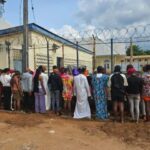Niger Delta, Disillusionment And Transcendence Of Impoverishment
By Jerome-Mario Chijioke Utomi
LAGOS MARCH 2ND (URHOBOTODAY)-In recent times, precisely in the last one year, many events birthed in response to the various challenges plaguing the people of the Niger Delta region, and aimed at ensuring that the people of the region benefit maximally from their wealth, through promoting infrastructural developments, environmental remediation and local content development has taken place.
Take as an illustration, the Petroleum Industry Bill or PIB which had been under review in the National Assembly for nearly two decades, beset by disagreements, including over how much revenue should go to local communities in oil-producing regions was finally in 2021, passed and signed into law. Within the same period also, Nigerians saw the Federal Government; among other things declare that this administration is determined to see through the completion of all the critical projects that had been embarked upon in the region.
Despite this New Vision for the region that holds the energy resources that has powered our progress for six decades as well as holds the keys to an emergent gas economy, each passing day brings to mind that as a nation, we are yet to learn useful lessons about what set the stage for the Niger Delta ugly experience. And now, evidence abounds that we are in the historians’ phrase doomed to repeat the mistakes that have already been made as the challenge in the troubled Niger Delta region is more of a man made and leadership deficit than natural.
This latest awareness was recently brought to the fore by the Kogi state Governor, Alhaji Yahaya Bello during an interview with the GbaramatuVoice, a Warri, Delta state -based Newspaper.
While lamenting that what we are facing today in the Niger Delta, is man made problems, not natural, the Governor explained that we have seen our environment devastated, a lot of development that should come in, are not coming in, people are poor and lots of issues, they are man-made, and it’s leadership problem.
In his words; The Niger Deltans that I know are largely peaceful, they are resilient, they are accommodating, they are resourceful, and all require appropriate leaders. What we shall do first is to ensure that Niger Deltans come up with a leader that is patriotic, that is empathetic, and sympathetic to their people who would understand what their people need and be ready to meet their needs; not leaders who will just enrich themselves and squander the resources, not leaders that will sell their people to the outside world, or to others. So once we have leaders who are ready to serve their people, we will recruit them and everything will flow down the line. A leader who will not convert the resources of the people. Remember, billions upon billions have been spent on both the NDDC, and the Ministry of Niger Delta, 13% derivation and the rest, yet there is nothing to see on the ground. He concluded.
Though he said it in a different way, venue and time, in the real sense of it, Mr. Governor may not have said something new or different from what Nigerians have been worried about all these years that billions upon billions have been spent on both the NDDC, and the Ministry of Niger Delta, 13% derivation and the rest, yet there is nothing to see on the ground.
For instance, some months ago, during my interview with Comrade Joseph Angodeme Evah, Coordinator, Ijaw Monitoring Group, and one of the Ijaw leading names in the human rights crusade in Nigeria, he shared a similar line of argument.
For instance, on 13% derivation, he captures it this way; we are not saying 100% as our expectation but because we are human beings, we will continue to talk to our leaders, let this thing be workable.
In 1999, I made a submission to Chief Olusegun Obasanjo, the former President of the Federal Republic of Nigeria, I remember telling him that the 13% derivation should be changed, and should not be given to the Governor because the governors see the 13% as a Christmas party.
Instead, he added, let us apply what Babangida did. Babangida used to trade by barter to build Abuja. He started the 13% with Julius Berger because Julius Berger could not be corrupted. Julius Berger built the Aso rock; Julius Berger built 90% of all the facilities. It was Julius Berger that changed Abuja to London. So, if he gives part of that 13% to Julius Berger Construction Company, you will see that Niger Delta will change to London.
Aside from Comrade Joseph, another illustrious son of the region/ public affairs commentator, in a similar style during a recent conversation queried; if the governors elected by the people of the region right from May 1999, were authentic leaders, if they had demonstrated a passion for their purpose, practiced leadership values consistently, led with their hearts as well as their heads, established long term, meaningful relationships and have the self discipline to get result, by now, the region will not be waiting for the Federal Government to provide solutions to real and imagined woes of the people of the region.
Continuing he said; What step or effort had the successive state governments made right from May 1999, when democracy re-emerged in the country, to improve the life chances of the people? Has the billions of naira collected by these governors reflected in the infrastructural availability in the region? Or that of the human capital development of the people of the region? Who should be blamed more? State or the Federal Government? I know the argument about this. It is not Federal Government but state governors in the region that are the real enemies of the people of Niger Delta, He submitted
What does this all mean to us?
To change this narrative, these are what this piece proposes.
First, Deltans must recognize that public order, personal and national security, economic and social programmes, and prosperity is not the natural order of things but depends on the ceaseless efforts and attentions from an honest and effective government that the people elect.
Governors on their part should not fail to remember that it takes a prolonged effort to administer a country well and change the backward habits of the people. They must be able to identify the problems and opportunities they face, evaluate the options they have for moving forward, and then make necessary trade-offs and decisions about how to proceed with the development of the region.
Niger Deltans urgently need to recognize that every society needs good people to have good government. For no matter how good the system of government is, bad leaders will bring harm to their people. On the others, evidence abounds that society could be well governed in spite of poor system of government, because good, strong leaders were in change’.
Utomi Jerome-Mario is the Programme Coordinator (Media and Public Policy), Social and Economic Justice Advocacy (SEJA), A Lagos-Based Non Governmental Organization (NGO). And could be reached via Jeromeutomi@yahoo.com/08032725374.





















